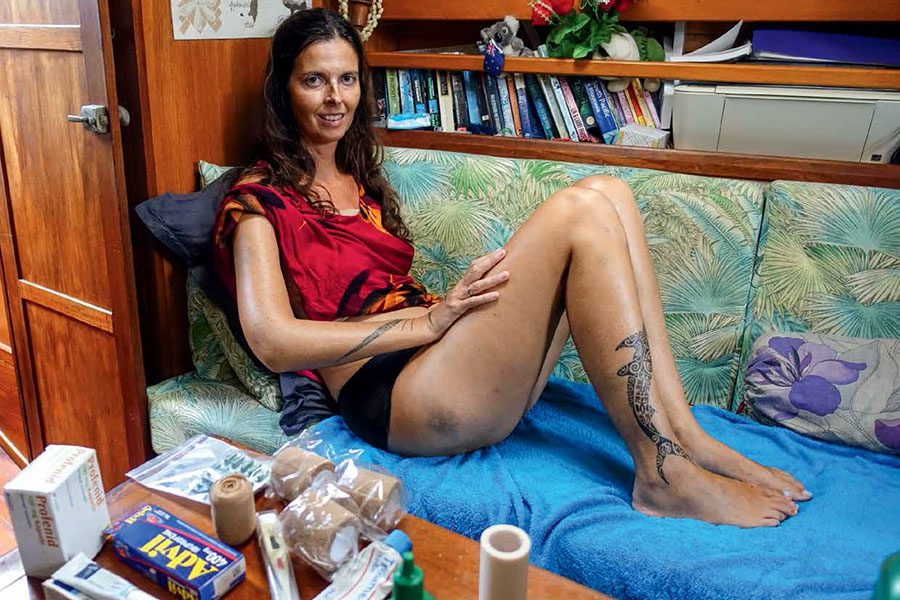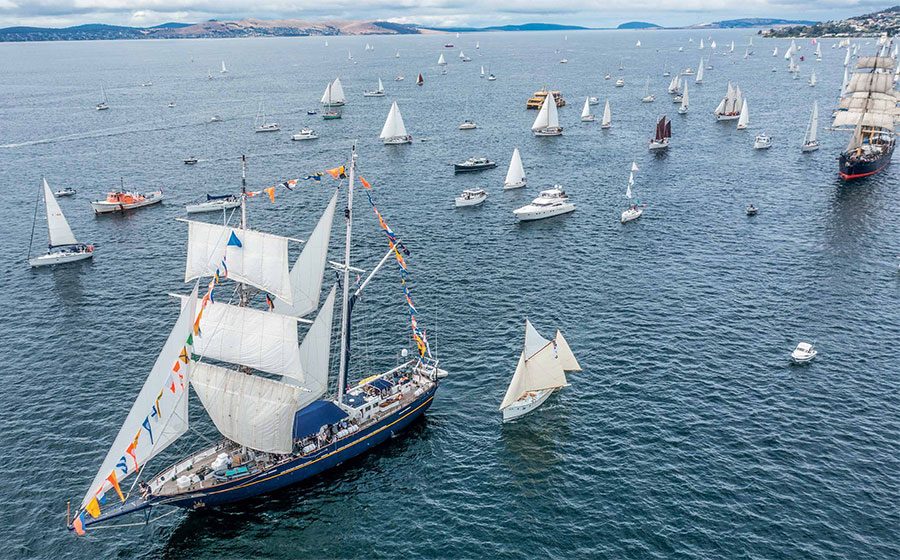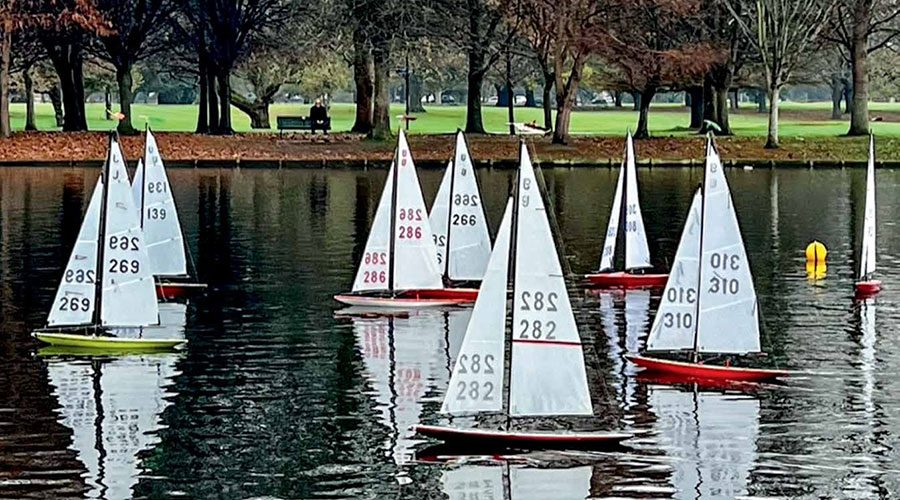

Christian and I have a new birthday: February 11, 2023. On that day we nearly drowned, only surviving thanks to tons of luck.
We hadn’t been on a risky adventure, just out with a local friend to take underwater pictures of a reef pass on the southern side of Matuku (Lau group, eastern Fiji) for a report to get government funding for a no-fishing ‘tabu’ zone there. Our friend and boatman Maikeli, the headman of the village of Makadru, wasn’t so lucky – his body was found two days later.
On this fateful morning we were reluctant to go. The weather was overcast and we both had a cold, but we didn’t want to disappoint Maikeli – and we were eager to help protect the environment of our favourite island in the Lau group.
So we went down south to the Daku passage in his 24ft open boat. Approaching the pass we saw that the swell outside was much higher than expected. We would never have taken our dinghy out in such conditions, but we thought Maikeli, who had spent all of his 58 years on Matuku, knew how to judge the situation.

The pass is short and upon exiting it on the ocean side, it became clear that the current wasn’t going in as we had thought, but was going out already because of the high swell! Additionally, a current set us sideways, towards the breaking surf.
Suddenly a gigantic wave built up ahead of the boat—a five-metre vertical wall. Maikeli gave it full throttle, trying to climb the wave, but we had no chance. The boat flipped over backwards and crashed down on us, together with tons and tons of frothing Pacific.
Nobody who hasn’t been swallowed by such surf can imagine the panic of being whirled around, the thundering noise, incredibly loud, with foaming turquoise everywhere, impossible to tell up from down, no more air, coming up coughing, struggling… Then the next wave breaking. The same struggle again. And yet another one, until we were back in shallower water on the reef.
Somehow, the capsized boat had righted itself; the anchor must have fallen out and anchored it on the reef. Christian managed to climb up on it, shouting and waving for us to come, but Maikeli and I were grabbed by the current and swept out of the pass again, towards the Pacific and almost certain death.

Looking back at Christian, I thought I was getting my last glimpse of him. It seemed so surreal – what a senseless way to die. This couldn’t be the end. My only chance was to swim sideways out of the four-knot current. Maikeli was drifting next to me, holding onto the boat’s fuel tank—that was the last time I saw him.
I swam for my life towards the edge of the reef passage, reached the breaking surf and got rolled and tossed across the reef again. I managed to struggle to the boat and Christian pulled me in, but we were still not safe. The the semi-submerged boat was anchored in a precarious position: close enough to the drop-off into the pass that the ripping current was trying to suck us out to sea and close enough to the outer edge of the barrier reef to have occasional waves breaking over us – only the boat’s bow was sticking out.
We were holding on to a line for dear life and I could feel broken ribs in my right side moving and grinding against each other, my right arm was swollen and almost useless. Christian was standing most of the time, looking for Maikeli and shouting, but there was no sign of him. We had to wait another hour until a boat passing by in the lagoon spotted us.
There is a hospital in Matuku, but they only have a few beds and a small pharmacy and no means to diagnose injuries. The nurse told me he could feel two broken ribs moving and wrapped me up tightly. As I could breathe and was not spitting blood, we assumed my lungs were okay, so we decided not to insist on evacuation by helicopter. The boat must have hit me in that very first wave after the somersault – I could dimly remember a dull, thumping sound. Christian must have jumped sideways to escape the wreck, or maybe he just got lucky, only suffering coral cuts and bruises.


We waited out some rough weather caused by cyclone Gabrielle far to the southeast of Fiji and then sailed with light southerly winds to Suva a week later – we had underestimated the sea state and I suffered horribly for 20 hours on our heavily rolling Pitufa.
When we arrived in Suva we decided not take our chances with the public hospital, but went to a private medical centre instead. It turns out the doctors who work at the big Colonial War Memorial Hospital during day tend to private patients at the centre in the evening! The facilities are modern and the staff friendly and professional.
After two days of x-rays and CT scans we were told that my injuries were much more serious than the initial (rudimentary) diagnosis had suggested: five broken ribs, a moderate pneumothorax (meaning a rib had punctured the lung and air had escaped into the space between lung and ribs, compressing the lung) and a partial tear in my right triceps tendon.
The general surgeon, Dr. Delasau, couldn’t believe the images. “Looking at the scans I would schedule you for immediate surgery, but looking at you walking and talking like you do, I just say, keep doing what you’ve been doing!” Listening to our narrative of the incident, the way I could only gasp for shallow breaths, he concluded that the right side of my lung may well have been completely collapsed at that point and had since healed itself – to the still alarming condition we now saw on the CT scan! Had we known on Matuku how critical my condition was, we had not have hesitated and insisted on air evacuation.


That was a week ago. We are still sad, shocked and in pain. The loss of our friend Maikeli, the headman of Makadru, was a serious blow to the island community, who lost a generous, caring man who worked tirelessly for the island. We feel strongly that something positive should come out of the accident.
We discussed overfishing and sustainable ways of fishing with the headmen and chiefs of Matuku during our last visit – they still have areas with wonderful coral and healthy fish populations, but the signs of overfishing are already there. We convinced them that protecting early means securing the future of their subsistence fishing and were happy to see planned tabu areas going through all seven villages like wildfire. At the risk of sounding theatrical, Maikeli basically died for the idea of sustainable fishing for the future of the island – he wanted a night-time ban on spearfishing in a permanent tabu area and a smaller core zone with no spear-fishing at all. We would therefore like to organise funding to help them with a “Maikeli Tamani Tabu zone for the future of Matuku”. It’s not much money probably, just to buy some buoys to mark it, a ceremony to start it off so people will know about it and respect it, and fuel to do occasional patrols with a longboat around the island to ensure the night-time tabu is observed.
We experienced how dreadful it feels to have serious injuries and no way to diagnose them without medical equipment. Talking to the islanders, we found many who had suffered fractures that went untreated and/or were diagnosed too late when they eventually made it to Suva. We are just now raising funds and trying to organise an x-ray machine for the hospital to help the doctor with diagnoses. This would serve not only Matuku, but also the neighbouring islands of Totoya and Moala. Dr. Etuwate was thrilled about our idea and has approached his superiors about it. BNZ
• If you would like to help us organise these projects for Matuku
• If you would like to support the funding, if you have contacts with companies of medical equipment
• If you know doctors/medical centres upgrading their equipment who might want to donate a used x-ray machine…
Please get in touch.
THE CREW
Birgit Hackl and Christian Feldbauer set out in 2011 from the Mediterranean and sailed via the Atlantic and Caribbean to the South Pacific where they have spent the last 8 years. More info and pics on www.pitufa.at.


WHAT WE HAVE LEARNED
We are cautious, careful people and have never felt in serious danger during 12 years of cruising, from the Med via the Atlantic, and right around the Pacific. We check tide-tables and weather before we go out in the dinghy and look at charts and satellite pictures to know where reefs and dangers are.
Whenever we go out in the dinghy, perhaps to go snorkelling, the main worry is an engine failure (even though our Tohatsu is very reliable).
So we take along:
• Oars
• A bottle of water in case of a long row
• Shoes (should we need to, we want to be able to drag the dinghy off the shallows without risking cut feet)
• An anchor on a long line tied to the boat (so we can anchor the dinghy if swept over shallow areas)
When we take the dinghy out in remote areas we add to the abovementioned equipment:
• A VHF (sometimes also an EPIRB) in a dry-bag
•A torch (in a dry-bag)
•And we turn on Pitufa’s anchor lights and AIS in case she goes walk-about while we’re away
Our mistake on the day of the accident was that we trusted Maikeli’s local knowledge and did not double-check ourselves. We will certainly not do that again.
The equipment we usually take along in our dinghy would not have been of any use after the accident, as everything got swept out of the capsized boat by the surf. Life-vests would not have helped either – already the first wave ripped away the masks and fins we were wearing and even opened the zipper of my shorty wetsuit. Life-jackets would have been torn off as well.
The additional buoyancy of the shorties certainly helped me swimming with broken ribs, but Christian was wearing his weight-belt and thinks it may be the reason why he was not swept into the pass again – he had more grip on the reef than Maikeli and I. That does NOT mean we’d recommend weight-belts against drowning, though.
Having an international health insurance is a very reassuring in an emergency – we would not recommend cruising without one.





